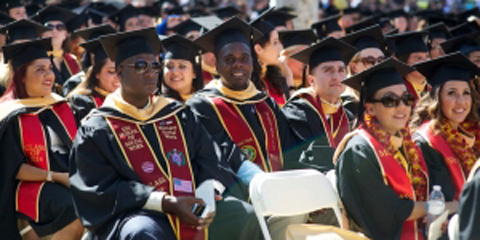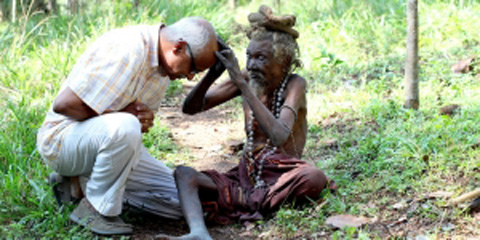News Archive
Research
-

The USC School of Social Work’s international influence continues to grow after Dean Marilyn Flynn and faculty traveled to Taiwan to discuss the importance of military social work.
Flynn, along with Anthony Hassan, clinical professor and director of the Center for Innovation and Research on Veterans & Military Families, and Carl Castro, assistant professor, were invited last month to share their expertise on the development of a military social work academic program and how it will benefit the country as it moves toward an all-volunteer military force.
-

Transitioning from a life on the streets to permanent supportive housing undoubtedly has benefits for individuals experiencing chronic homelessness.
Researchers have found that the stability of having a place to call home may enable individuals to seek treatment for drug use problems, develop stronger ties to positive sources of support such as friends and family, and receive medical care for chronic health conditions. However, the shift to housing may result in unexpected and unintended changes.
-

The USC School of Social Work reached a new graduation milestone on Friday with its largest class of students graduating from its innovative online Master in Social Work program, the Online MSW. The USC School of Social Work celebrated a graduating class of more than 1,300 students between its on-campus and online Online MSW programs. Of this class, more than 160 graduates traveled to Los Angeles from across the country to celebrate their achievement. This is the third year the USC School of Social Work has brought together students from both programs to walk together at commencement.
-

A researcher in the USC School of Social Work has assembled a multidisciplinary team to study how the “built environment” of neighborhoods and surroundings influences the long-term health of homeless people who live in state and federally supplied housing.
-

The Center for Innovation and Research on Veterans & Military Families (CIR) at the USC School of Social Work received funding from the Science Applications International Corporation (SAIC) to help publicize the unique transitional challenges facing National Guard and Reserve service members.
-

In the lush, verdant hills of India, Bhagavan Kani rises from his bed.
He spends a few serene moments gazing at the early morning sun as it crests the horizon, sipping water infused with a local spice leaf called tulsi. Kani eats a simple breakfast of raw vegetables and fruits. Barefoot, he sweeps the leaves from a dirt path in his garden and climbs steep stone steps to take a stroll through the hilly village. Later that day, he sits outside his coconut-leaf-thatched hut, recites tribal songs, and talks to plants and animals.
-

Vern Bengtson, a senior scientist with the USC Edward R. Roybal Institute on Aging at the USC School of Social Work, is the recipient of the 2014 Eugene Litwak Award from the Mailman School of Public Health at Columbia University.
Each year, a distinguished social scientist whose research addresses the social dimensions of health and illness is honored by Columbia’s Mailman School and invited to give a public lecture. The event was established in honor of Eugene Litwak, professor emeritus of public health, social work and sociology at Columbia University.
-

For decades, young people who ran afoul of the law found themselves in dismal locked facilities, surrounded by barbed wire and chain-link fences.
These jail-like structures, featuring large dormitories and staff members who relied on a controlling and coercive model of oversight, have proven to be ineffective and harmful, leading to increased recidivism, lower academic achievement, issues of alcohol and substance abuse, and mental health problems among youths.
-

Ron Avi Astor’s social work career started out with a series of coincidences.
-

Every year, residents of Lucca, in Tuscany, celebrate the end of Nazi occupation by honoring the Americans who came to liberate it.
In 1944, much of occupied Tuscany was freed by the U.S. Army 92nd Infantry Division, the only segregated division to fight in Europe during World War II. They were known as buffalo soldiers.
“Here we were in World War II, giving them their freedom and not even free ourselves,” said Ivan Houston, a former Army sergeant and author of “Black Warriors: The Buffalo Soldiers of World War II.”
“We were second-class citizens.”